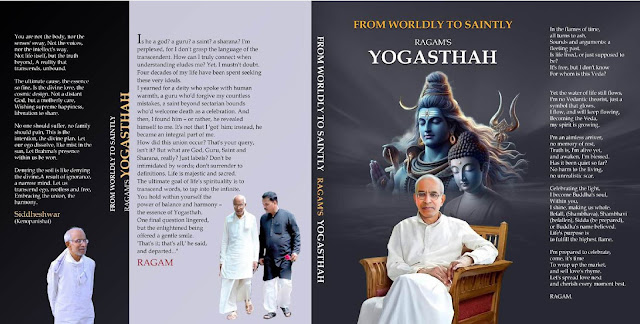This is a spiritual biography of Sri Siddheshwar Swamiji of Jnana Yogashram in Vijayapura who was fondly and reverently known as Nadedaduva Devaru (A Walking God). After attaining sainthood, Swamiji resided in Vijayapura, where he was initiated into Jnana Yoga by his spiritual Guru, Sri Mallikarjun Swamiji. Renowned as one of the greatest yogis Karnataka has ever known, Siddheshwar Swamiji breathed his last in 2021.
Ragam (Dr. Rajashekhar Mathapati), who
spent over three decades in close proximity to Swamiji – almost as his disciple
and a highly trusted personal acquaintance – wrote this spiritual biography. He
held a deep respect for Swamiji’s teachings and his unique style of living.
The literary value, cultural significance, and moral relevance of such a work of art are deeply rooted in the person whose spiritual journey – from humble beginnings to the attainment of the highest peak of sainthood – is depicted. The protagonist of Yogasthah is Siddheshwar Swamiji, who not only embodied the life of a saint in both word and spirit but also demonstrated his saintliness and unwavering truthfulness at every step.
Ragam’s book explores the reasons why Siddheshwar Swamiji not only became a saint of the highest order but also attained moksha while still alive.
Siddheshwar Swamiji refused to be politicized and remained vigilant about the politicization of spirituality. Politicians often seek individuals of the highest integrity to lend credibility to their agenda, using them to win the hearts of voters and secure political power. Swamiji was fully aware of the dangers and implications of politics. It is also important to note that no political leader ever attempted to exploit their proximity to Swamiji for personal gain. Siddheshwar Swamiji deeply understood the value and significance of the sainthood he attained through the blessings of his guru and through his own tapas.
Ragam’s book pays close attention to the simplest details of Swamiji’s life. Siddheshwar Swamiji was an avid reader who read anything his eyes fell upon. No book of philosophy, literature, biography, or autobiography that was worthy of reading escaped his attention. He had a deep respect for the great philosophers of the world.
The book offers readers not only an opportunity to understand a saint but also to engage in a meaningful dialogue with him, and, if possible, to negotiate with him in search of a path to reach God's abode. It establishes that Siddheshwar Swamiji consciously maintained a balanced approach between the religious and the secular in Indian philosophy. He had a deep respect for India’s metaphysical and spiritual traditions and kept them alive by continuously engaging with the Vedas, offering insights into the works of Indian philosophers throughout history in the light of these ancient texts.
Dr. Basavaraj Dunor Senior Professor, CUK


No comments:
Post a Comment